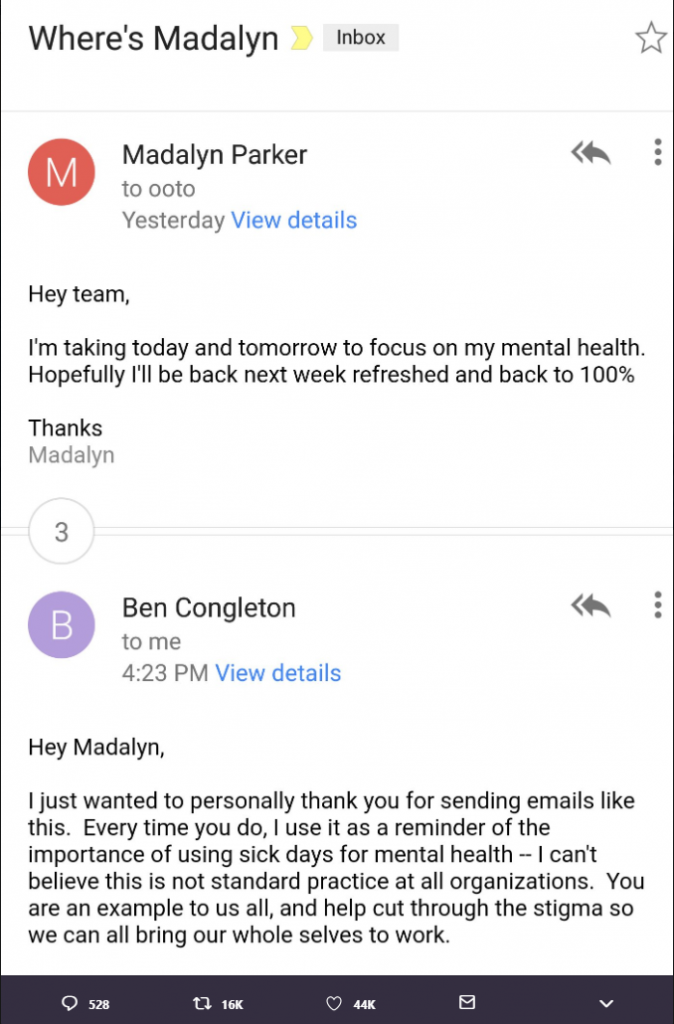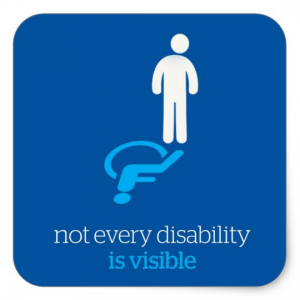It’s 2019 and society is slowly winning the battle against stigma surrounding mental health. NHS posters across London ask commuters “How are you feeling?”, “How is your sleep?” and “Are you able to look forward to things as much as you used to?” – and charity campaigners are working to make sure we’ve all heard that “approximately 1 in 4 people in the UK will experience a mental health problem each year”. But are these campaign messages really sinking in enough to change our behaviour in everyday life? How would you feel if your colleague took a week off work for their mental health, leaving you to cover their job, and would you feel able to do the same?
What are ‘mental health days’?
Despite general sickness absence rates being the lowest on record in recent years, the percentage of those absences due to mental health reasons has increased by 25% each year and it is estimated that this number will continue to rise. These absences have been named ‘mental health days’, when individuals take time off work to focus on their wellbeing and mental health.



Posters on the London underground, encouraging passengers to seek help for symptoms of poor mental health
Why are ‘mental health days’ controversial?
Mental health is listed as the 4th most common reason for sickness absence in the UK, but it is not always accepted that these days off are necessary. Everyone has different levels of lived experience with mental health disorders – and with that comes a wide range of opinions. While some may not see the necessity in people taking time off for their mental health, others may have tried it and found benefit, subsequently encouraging others to do so.
In fact, research from the World Health Organisation suggests that people who go to work while experiencing mental illness will be significantly less productive; and taking a leave of absence can increase productivity upon return. Unfortunately, reactions from colleagues and employers are not always positive. Especially given that colleagues can be left to cover excess work, which can have damaging effects on their mental health. It was recently discovered that 15% of employees who disclose a mental health issue at work face disciplinary procedures.
This ongoing issue often boils down to the fact that mental health is so frequently misunderstood. There remains the criticism that individuals struggling with their mental health might be ‘faking it’ just to get a day off work. However, there are also physical and social aspects of mental health disorders. For example, depression is not just a low mood. Individuals with severe depression may experience catatonia, which involves an inability to move normally, meaning not only are these sufferers unable to speak properly – but they may also incur a genuine inability to get up and go to work. Anxiety disorders can have equally debilitating effects. For example, social anxiety (or social phobia) includes an overwhelming fear of social situations which can make it incredibly difficult to leave the house. These disabilities are often overlooked in the workplace, despite our understanding that “approximately 1 in 4 people in the UK will experience a mental health problem each year”.
Why is change needed and how can we achieve it?
Absences due to mental health are reported to cost the UK £10.6 billion annually and these costs are increasing each year.
In order to tackle this rising figure, we must first acknowledge the differences between work sectors and views on this topic. To draw on personal experience, I (Anna) used to work in retail, and for those of you who have ever worked within the service industry you will appreciate how difficult it is to take time off – full stop. Alternatively, some managers make a conscious effort to recognise and acknowledge the importance of mental health days, as seen in the below tweet from @madalynrose, which subsequently went viral…
Ultimately, this issue is entirely subjective and down to the management team and their experiences, there is nothing written as a rule of thumb or protocol, unlike with physical health. This is something that could change. Although physical first aiders are required by law in each workplace, there are no legal requirements for mental health first aiders in the UK. The associated risks around physical health are currently taken more seriously. Some courses do exist for employers regarding mental health awareness and training to recognise signs (e.g. MHFA training), and it is estimated that providing better support for mental health in the workplace can save UK businesses up to £8 billion per year.
If you take forward anything from this blog, remember that disabilities are not always visible. Taking time off work for your mental health can be just as vital as taking time off for something like a broken leg. We often find it easier to understand why someone is taking a leave of absence when signs of illness are visible, but we should work toward recognising mental health signs too.




